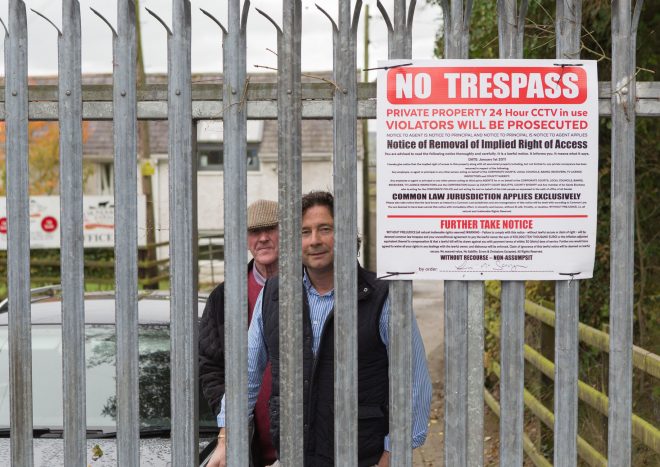
Premises owner Liam McGavigan with Thomas Baird. KMG04
THE former owner of a Lifford meat plant, which had been occupied for several months in a dispute with a bank-appointed receiver in 2016, is back working there as manager.
Speaking to the Donegal News yesterday, Thursday, Mr Liam McGavigan confirmed that the meat plant and abattoir had carried out its first kill earlier this week.
The facility, which had been operated by Edenmore Farm Meats Ltd., ceased operating more than eighteen months ago after several people barricaded themselves into it in a dispute about the take-over of the premises by a bank-appointed receiver.
At the time Mr McGavigan gave the sworn undertaking to the High Court that he would vacate the premises.
A group of more than 100 Donegal farmers who supplied Edenmore Farm Meats Ltd subsequently claimed they were owed over €1m from the Lifford meat factory.
“I’m working within the company to try and make sure it’s a success for the new owners – C&J Meats – while I’m also trying to help farmers recoup the money that’s outstanding to them. I’m personally owed a considerable sum of money too,” he said.
“Edenmore Farm Meats Ltd have disappeared. They’ve filed no returns and the company has been struck off. I’ve have since sold the plant to C&J Meats. They have carried out refurbishment works and we done our first kill this week.
“At the minute, I’m working as the manager and we’re working off a skeleton staff but I’m advertising for workers on their behalf. Initially, they hope to employ twenty-five people – rising to over fifty,” Mr McGavigan said.
“Any issues that I may have had have all been resolved and I’m working closely with the farmers to try and solve their problem. I’m also working through other legal channels,” he added.
In November 2016, AIB and receiver Mr Luke Charleton were given permission by the court to serve at short notice proceedings against the former owner of the plant Liam McGavigan, his brother Ciaran and unknown others allegedly occupying the plant.
It was claimed the two McGavigans, along with others, have effectively shut down operations there by the sit-in. At its peak, up to 500 farmers a month would send cattle to the plant for slaughter. It employed 55 workers.

Liam McGavigan
Advertisement
Receive quality journalism wherever you are, on any device. Keep up to date from the comfort of your own home with a digital subscription.
Any time | Any place | Anywhere
Posted: 8:30 am May 11, 2018









